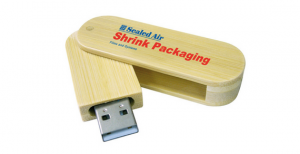USB Pen Drives: Small Device, Big Benefits for Business

It happens in boardrooms everywhere: the internet connection fails mid-presentation, cloud files will not download, or security protocols block access to critical documents. In these moments, the simple yet effective USB pen drive transforms from overlooked legacy tech to invaluable business tool.
In a business landscape dominated by sleek cloud solutions and subscription services, physical storage devices rarely get the recognition they deserve. They are not trendy or headline-worthy. But when deadlines loom and technology inevitably fail at the worst possible moment, these pocket-sized branded USB sticks deliver with zero fanfare.
While businesses cycle through the latest tech trends, USB pen drives keep quietly handling critical tasks that flashier solutions can not. Here is the truth about why these seemingly outdated tools still deserve a place in your business toolkit.
Why Businesses Still Use Branded USB Drives
USB drives are not the sexiest tech. They do not have the “wow factor” of AR demos or AI chatbots. But that is exactly their strength – they are reliable workhorses that businesses depend on when everything else fails.
Their value becomes immediately apparent when:
Conference Wi-Fi collapses under the weight of 200 simultaneous connections
Client security protocols prevent cloud access to critical files
Large presentation files exceed email attachment limits and sharing links do not work
When branded with a company logo, these custom USB pen drives transform from generic tech into something surprisingly powerful – a physical extension of business that lives in clients’ workspaces. Unlike branded pens that get lost in drawers or stress balls that collect dust, USB drives actually get used. Each time someone plugs it in, they are reminded of the company without the intrusion of another email or ad.
Real-World Business Applications
Across various industries, USB pen drives for storage consistently prove their worth in specific scenarios:
For high-stakes presentations: Marketing directors often carry backup USB drives to client pitches. Cloud access can fail at critical moments and being prepared with an offline backup ensures presentations proceed smoothly regardless of internet availability.
For creative professionals: Photographers and videographers use custom USB drives to deliver final projects. For emotional content like wedding photos or brand videos, having a tangible delivery method feels more significant than sending a simple download link.
For legal and financial services: Law firms and financial consultants often use encrypted USB drives for document transfers. Some information is too sensitive for email or cloud storage and clients appreciate having physical control of their confidential documents.
For trade shows and events: Instead of printouts that often get discarded, companies can load product catalogs, pricing sheets and specifications on branded USB drives. These digital materials take up less physical space while providing more comprehensive information than traditional printed materials.
Choosing USB Drives That Actually Work
Selecting the right USB pen drives for business requires consideration of several practical factors:
Storage that makes sense: Ordering 128GB drives to distribute 50MB PDF files is unnecessary overkill. For most business uses, 16-64GB provides plenty of space without inflating costs. Reserve larger capacities for video files or comprehensive catalogs.
Materials that reflect brand values: A sustainability-focused company using cheap plastic drives creates a disconnect with their messaging. Materials should align with overall brand positioning. Options range from traditional plastic to bamboo, recycled materials and metal finishes.
Design that works in real life: Beautifully designed custom USB pen drives that can not physically plug into a laptop without removing the case create frustration rather than positive impressions. Before ordering in bulk, these functionality aspects should be tested:
Connection compatibility with common computers
Logo visibility during use
Overall feel and durability
Speed that does not frustrate: Watching a progress bar crawl while transferring files creates a negative user experience. The difference between USB 2.0 and 3.0 is significant – cutting corners on speed becomes apparent when distributing larger files.
The Environmental Reality
USB drives contain electronics that are not easily recyclable – this fact can not be ignored. However, when considering environmental impact, comparison with alternatives provides important context.
Companies frequently print hundreds of multi-page catalogs for trade shows, only to discard untouched copies afterward. By contrast, distributing USB drives for corporate use containing the same catalog plus videos and interactive content eliminates paper waste while creating something recipients keep and reuse.
For businesses concerned about environmental impact, these considerations matter:
Selecting drives made with recyclable materials where possible
Ordering realistic quantities based on actual needs, not optimistic projections
Using drives designed to serve multiple purposes beyond a single file transfer
No solution is perfect, but branded USB sticks often create less overall waste than printed materials that frequently end up in trash bins before leaving the venue.
The Bottom Line
USB drives will not revolutionise business operations. They will not disrupt industries or feature in innovation reports. And that is perfectly fine – because not every business tool needs to be revolutionary.
Sometimes the most valuable tools are the ones that simply work when everything else does not. USB drives offer something increasingly rare in business tech: reliability without complexity, functionality without subscriptions and tangibility in a digital world.
Wholesale USB focuses on quality components that do not fail when needed most. The 6-year warranty is not marketing fluff – it is a commitment based on actual failure rates and component testing.
Straight Answers to Common Questions
How long do USB drives typically last? With quality components, a USB drive should last 5-10 years with normal use. The limiting factor is usually physical damage rather than component failure.
Are different colours and styles available in smaller quantities? Yes. While many suppliers force customers into massive orders, mixed colour options starting at 25 units are available. For quantities under 25, standard colours with custom printing offer an alternative.
What happens if drives fail? Quality suppliers stand behind their products. If drives fail under normal use within the warranty period, reputable vendors replace them without hassle.
Are rush orders possible? Yes, but with realistic timelines. Rush production is available when physically possible, with transparent pricing that reflects actual production requirements.

